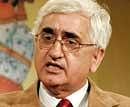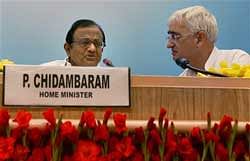

"We are committed to giving share to the backward among Muslims in the reservation list for backward castes," Minority Affairs Minister Salman Khurshid said.
"This was also recommended by Sachar Committee and we have promised it in our (Congress) manifesto as well to which we remain committed," Khurshid told reporters on the sidelines of a function of the National Minority Commission here.
He said the commitment follows suggestions from Sachar committee as well as the "successful experiments in Tamil Nadu, Kerala and Karnataka" of giving the backward sections among the minority community separate and special representation in the backward list.
"We can move forward on the basis of what we have done in these three states," he said citing the example of Bihar, where a similar step has already been taken.
Addressing the annual conference of State Minority Commissions, Khurshid said even the Andhra Pradesh High Court, which rejected the state government's move twice to get reservation for Muslim backward did not reject the concept of quota for them within existing 27 per cent OBC reservation.
He said the court rejected its application on the grounds of "non-scientific and inadequate survey". "Fortunately the Supreme Court has preserved the 4 per cent reservation for backward Muslims given in the state," he added.
Underlining the need to go beyond reservation, he said other affirmative action can also be considered for backward among Muslims like it is done for the scheduled castes.
He said that his ministry is also trying to convince the Prime Minister to bring down the cut off rate of minority population from 25 per cent to 15 per cent for declaring a district minority-concentrated in the next plan.
"If that happens we would be able to include 40 to 45 more districts," he said. Currently, the scheme is running in 90 minority concentrated districts (MCDs).
Making a strong pitch for the formation of the Equal Opportunity Commission, Khurshid said that the such a panel will not take away the mandate of any other Commission and it seeks to create equal opportunities and ensure empowerment for all disadvantaged sections. Responding to a demand for more power for the National Minority Commission, Khurshid said, "In a great sense much of our decisions regarding NCM and other Commissions will be taken after we take a final view on EOC."
Explaining the Central government's constraints in notifying any other community as minority due to a Supreme Court order restricting it from doing so, Khurshid said the issue "calls for a fresh look".
"It seems like a legal lacunae that we have notified five minority communities but are unable to notify any more. State governments have the right to do it," he said.
On Ranganath Mishra Commission report, the minister said that the government is still considering the issue and the 77 recommendations of the panel have been sent to various ministries for their view after which a collective decision could be taken. "Till that time it will be difficult to say anything more on the issue," he added.
The minister also said that it is not possible to fulfil every desire and hope but was quick to add, "It is not because there is reluctance within the government. It is because the government is to ensure consensus."
Alluding to the various demands of the NCM for the protection and furtherance of minorities' interests, Khurshid said that the Commission should also keep in mind that "incremental growth will be more successful than dramatic jumps that can lead to differences in the society".
NCM Chairman Md Shafi Qureshi said that a view is gaining ground that the Commission is a "toothless and ineffective" body adding that it does not have powers to independently investigate complaints of discrimination and deprivation of rights of minorities. He also made a strong demand for constitutional status to NCM.
Referring to an earlier decision to make NCM a constitutional body for which a bill was also introduced in Lok Sabha, Qureshi said, "It is imperative that the government no longer delay the process of conferring constitutional status on this body with adequate powers."
The Commission Chairman also called for implementing the recommendations of the Sachar Committee "both in letter and spirit". He urged the government to "explore the possibility of enacting a law to prevent atrocities against minorities" on the lines the such an Act for the Scheduled Castes.
Qureshi noted with concern that the benefits of various schemes have not accrued equitably to the eligible sections among minorities and rued that the response to the monitoring mechanism devised by the Commission to evaluate and review such programmes has been lukewarm.
He also called for reaching out to the members of the community directly to get them benefits of these programmes and said the state minority commissions can provide a link between the community and the implementing agencies.
Qureshi at the same time maintained that there is "little synergy" and "hardly any sharing of information" between NCM and state minority commissions and promised to take up new initiatives to fill the gap.
He also raised the issue of absence of minority commissions in as many as 13 states. Khurshid later told reporters that he will personally speak to Chief Ministers of these states and will try to ensure that minority bodies are constituted there.